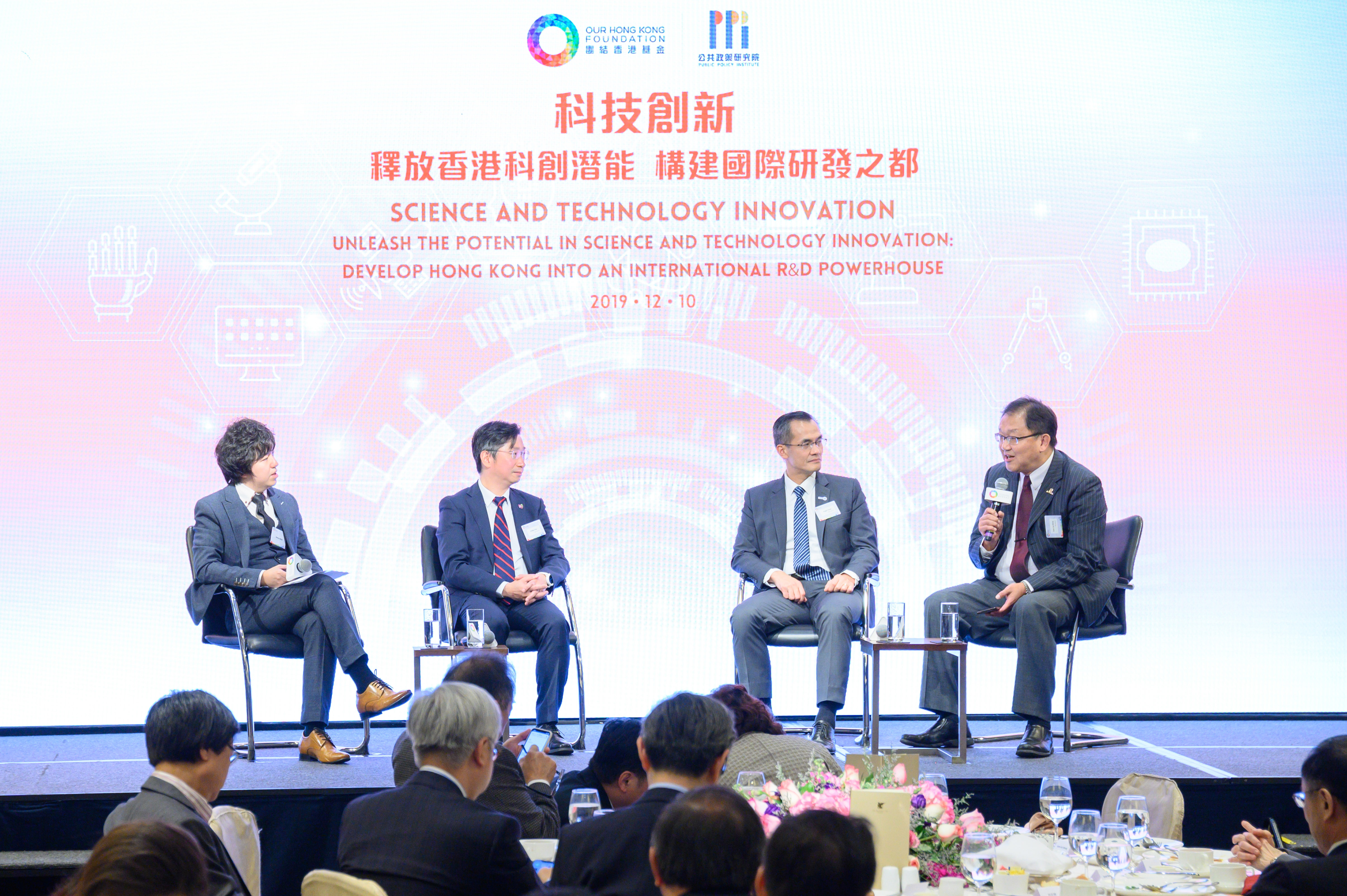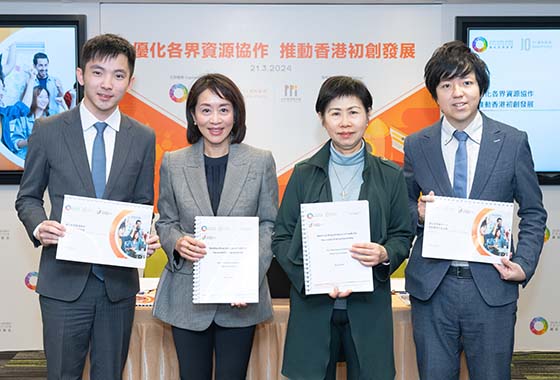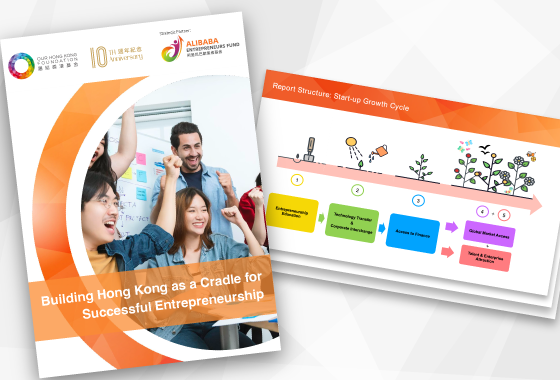OHKF Innovation and Technology Research Report Initiates to Unleash Hong Kong’s Potential as an International Research and Development Powerhouse
OHKF Innovation and Technology Research Report
Initiates to Unleash Hong Kong’s Potential as an
International Research and Development Powerhouse
Our Hong Kong Foundation (OHKF) has launched a new research report today, titled “Unleash the Potential in Science and Technology Innovation: Develop Hong Kong into an International R&D Powerhouse”. The report puts forward the recommendation for the establishment of interdisciplinary and cross-institutional mega research institutes to drive the development of Hong Kong’s overall science and technology innovation ecosystem. Besides, the report recommends a series of actionable measures to make science and technology innovation a critical growth engine for Hong Kong’s economy through addressing the needs of three fundamental areas: funding, talent, and collaboration.
Establishing Interdisciplinary and Cross-institutional Mega Research Institutes
The OHKF believes that research and development (R&D) is the foundation underlying science and technology innovation. To fully drive research forward, Hong Kong may take reference from successful examples such as the Broad Institute in the United States to set up mega interdisciplinary and cross-institutional research institutes. These institutes would attract top international scientists to engage in large-scale collaborations to make breakthroughs on the frontier of basic research. In addition, such institutes may provide local researchers with a promising career path, which would also inspire and motivate Hong Kong’s students who are interested in studying STEM subjects (Science, Technology, Engineering, and Mathematics) and embarking on a career in R&D. As a result, the entire science and technology innovation ecosystem in Hong Kong will be given an invigorating stimulus to grow and prosper.
With a view to enhance Hong Kong’s science and technology innovation ecosystem to create the optimal conditions for mega research institutes to flourish, the Foundation has made a series of recommendations in this report, which aim to provide higher-level strategies, build the R&D talent pipeline, and promote tripartite cooperation among academia, R&D centres, and industries.
1. Providing Higher-level Strategies and Enhancing R&D Funding Flexibility
The report points out that the current R&D funding sources in Hong Kong are fragmented, which cause inconsistencies and redundancies, and also lead to the absence of an overarching strategy to guide funding allocation. The report recommends the HKSAR Government’s Steering Committee on Innovation and Technology to take reference from Singapore’s National Research Foundation and the UK Research and Innovation to establish an overarching Research and Development Foundation (RDF). The RDF will provide higher-level strategies and advise prioritised areas to guide R&D funding allocations.
In addition, the report indicates that the Government’s R&D funding mechanism lacks flexibility. For example, the average processing time taken by the Innovation and Technology Commission to approve projects for its five R&D centres could take between 158 to 222 days, which limits the research efficiency of R&D centres. The report advocates to increase the funding autonomy and flexibility for R&D centres with reference to other public institutions in Hong Kong, such as the University Grant Committee’s research funding mechanism for universities.
2. Building the R&D Talent Pipeline and Providing a Promising R&D Career Path
The number of R&D talents in Hong Kong is relatively small, with only 3,400 researchers per million population, which is only about half of Singapore’s ratio. One of the key reasons is that the ratio of research postgraduate students (RPg) to professors in Hong Kong is only 2.4: 1, far lower than that of 4.1: 1 in the United Kingdom. The report recommends the Government to gradually increase the number of research postgraduate students in order to raise the ratio of RPg students-to-professors. At the same time, the Government should expand the scope of eligible areas of admission under the Technology Talent Admission Scheme (TechTAS) by including technology-related professional areas such as intellectual property protection and technology management, in order to facilitate the conversion of Hong Kong’s R&D outputs into marketable products.
Besides, the combination of a scarcity of research graduates and a lack of scientific research positions in Hong Kong is forming a vicious cycle. Establishing mega research institutes, as recommended in the report, will help break this cycle by providing more internationally competitive jobs and building a promising career path for scientific researchers, thereby retaining locally-grown talents and incentivising local students to study STEM subjects at universities.
3. Fostering Cross-institutional Collaboration to Release Potentials from Upstream to Downstream Research
In Hong Kong, there has always been insufficient interdisciplinary and cross-institutional collaborative research. Only 48% of all research funding from the Research Grants Council are allocated to collaborative projects in Hong Kong, which is far lower when compared to 75% in the UK Research and Innovation’s Research Councils. One of the main reasons for this is that the assessment criteria at the individual and institutional levels are biased towards individual research, which hinder the formation of a collaborative research culture. The report recommends revising individual and institutional Key Performance Indicators (KPIs) to incentivise collaborative research. For example, the contribution of co-authors should be given greater recognition, while collaborations between universities and other institutions should also be fairly reflected in the evaluation system. The mega research institutes, as proposed in the report, is another critical R&D infrastructure that can encourage in-depth, interdisciplinary and cross-institutional collaboration in leading scientific fields.
Besides, existing collaborations among universities, R&D centres, and industries in Hong Kong still require improvement. The report suggests that the R&D centres could emulate the model of Germany’s Fraunhofer Society. At the industries’ end, it should take advantage of the opportunities in the Greater Bay Area to strengthen collaboration between R&D centres and industries at the high-end of the value chain. At the universities’ end, R&D centres should strengthen their ties with local universities to improve the quality of their scientific research and deepen the tripartite collaborative relationship between the industries, R&D centres, and universities.
Mr Stephen Wong, Deputy Executive Director and Head of the Public Policy Institute of OHKF, said: “The establishment of mega research institutes is of great importance to the development of science and technology innovation in Hong Kong, for they not only provide promising career prospects to local graduates that aspire to conduct research, but also offer the sector an abundance of resources, shared scientific research facilities, and an environment conducive to collaboration. This will attract the world’s top scientists to come to Hong Kong, where they can make breakthroughs in the most cutting-edge research areas.”
Mr Kenny Shui, Assistant Research Director of OHKF, further commented: “Hong Kong is one of the most competitive economies in the world, but it needs to catch up in terms of its innovation capability. Fortunately, Hong Kong possesses competitive edges in science and technology innovation through our basic research, which secures us an early advantage. With further improvement in the local conditions for science and technology innovation, Hong Kong definitely stands a strong chance of developing into an international R&D powerhouse.”







